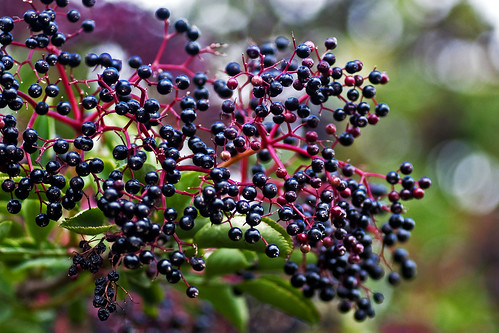Experts recommend 20-35 grams of fiber from food (not supplements) daily for children and adults. Some tips to reach that amount:
- Replace meat with beans two to three times a week.
- Choose brown rice and whole grain products over white rice, bread and pasta.
- Snack on cucumbers, carrot sticks and other raw vegetables instead of processed bites like chips.
- Pick whole fruits over fruit juices.
- Reach for these top natural sources of fiber among fruits and vegetables:
FRUITS:
-
Purple passion-fruit – 10 g/100 g
-
Elderberries – 7 g

elderberries image by me'nthedogs via Flickr cc
-
Avocados – 7 g
-
Kumquats – 6 g
-
Raspberries – 6 g
-
Rowal – 6 g
-
Strawberry guava – 5 g
-
Abiyuch – 5 g
-
Blackberries – 5 g
-
Sapodilla – 5 g
VEGETABLES:
1. Grape leaves – 11 g
Stuffed grape leaves with yogurt mint sauce (Jason/Lam/Flickr)
2. Fireweed leaves – 11 g
3. Artichokes, boiled with or without salt – 9 g
4. Pinto beans, boiled with or without salt – 9 g
5. Potatoes with skin, baked with or without salt – 9 g
6. Wasabi, root – 8 g
7. Cowpeas, boiled with or without salt – 6 g
8. Pigeonpeas, boiled with or without salt – 6 g
9. Lima beans, boiled with or without salt – 6 g
10. Green peas, boiled with or without salt – 6 g
* Nutrient data source: USDA
© K Kristie